Nine Divine Connections Between the Blessed Lands of Shaam and Yemen

Shaam and Yemen have an important status in Islam and they play a pivotal role in our rich history. They are home to places like Masjid Al-Aqsa, the earliest masjids of Islam, and the graves of many prominent Sahabah (ra). The people of Yemen were some of the first people to be taught Islam, by great Sahabah such as Abu Musa al-Ash‘ari (ra), Mu‘adh ibn Jabal (ra) and Ali ibn Abi Talib (ra). Meanwhile, Shaam was the foundation for centuries of Islamic society and administration, since the Umayyads ruled from Damascus in Syria during the early period of Islam.
Many Muslims thus feel a deep connection with these lands. But did you know that Allah (swt) and His Messenger (saw) actually connected Shaam and Yemen in several ways? More than being historically important, these lands are divinely blessed, and it is thus essential that we learn more about these places and their people.
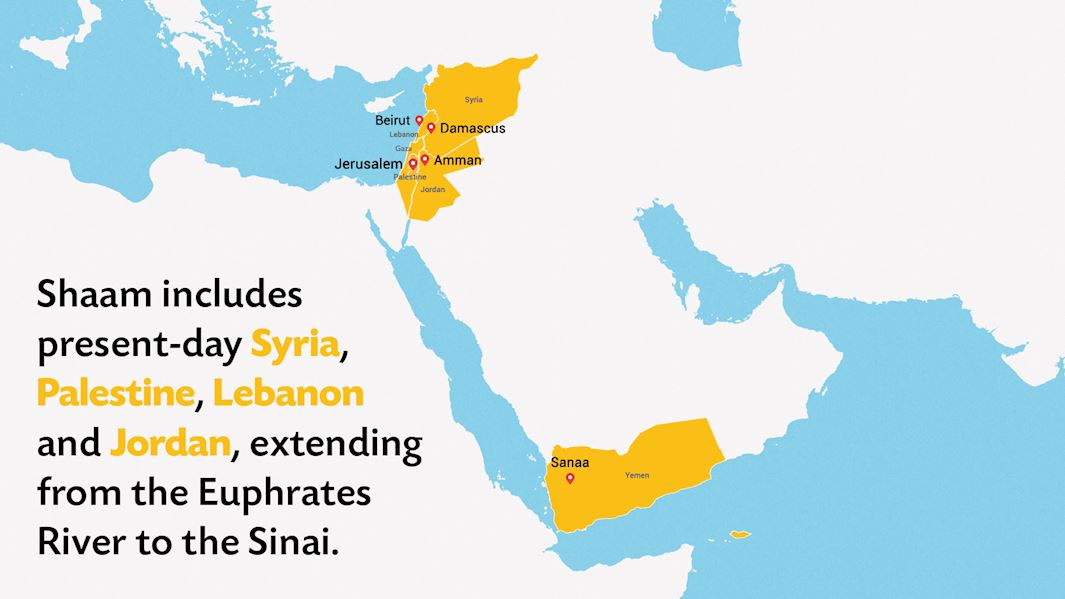
Without further ado, here are nine divine connections between Shaam and Yemen that every Muslim should know.
One: Allah (swt) mentioned them both in the Qur’an
Firstly, Allah mentions both Shaam and Yemen in Surah al-Ma’idah. Shaam is described as ‘the holy land’ [Qur’an, 5:21], and later on in the same Surah Allah also honours the people of Yemen, listing several of their virtues:
’a people He loves, and they love Him, [who are] humble towards the believers, powerful against the disbelievers; they strive in the cause of Allah and do not fear the blame of a critic. That is the favour of Allah; He bestows it upon whom He wills’. [Qur’an, 5:54]
Allah chose to favour both Shaam and Yemen and their people and it is important to pay attention to this. As Allah says in the Qur’an, ′And your Lord creates what He wills and chooses; not for them was the choice’. [Qur’an, 28:68]
Elsewhere in the Qur’an, Allah refers to Shaam as ‘the land, which We have blessed for the worlds’. [Qur’an, 21:71]
He (swt) also mentions the land of Yemen as ‘a Good Land (with) a Forgiving Lord’. [Qur’an, 34:15]
In this way, both lands have been given the highest status: they are given a blessed mention in the Qur’an itself.
Two: Shaam and Yemen are connected by the Ka’bah
Linguistically, one of the meanings of Shaam is derived from the Arabic word ash-Sha’m, meaning ‘the north’. This basically means it is north of the Arabian Peninsula, which includes present-day Syria, Palestine, Lebanon, and Jordan, extending from the Euphrates River to Sinai.
However, Shaam is also derived from the Arabic ‘left’, while Yemen is derived from the Arabic ‘right’. Their names are actually connected by the sacred House of Allah in Makkah: the Holy Ka‘bah:
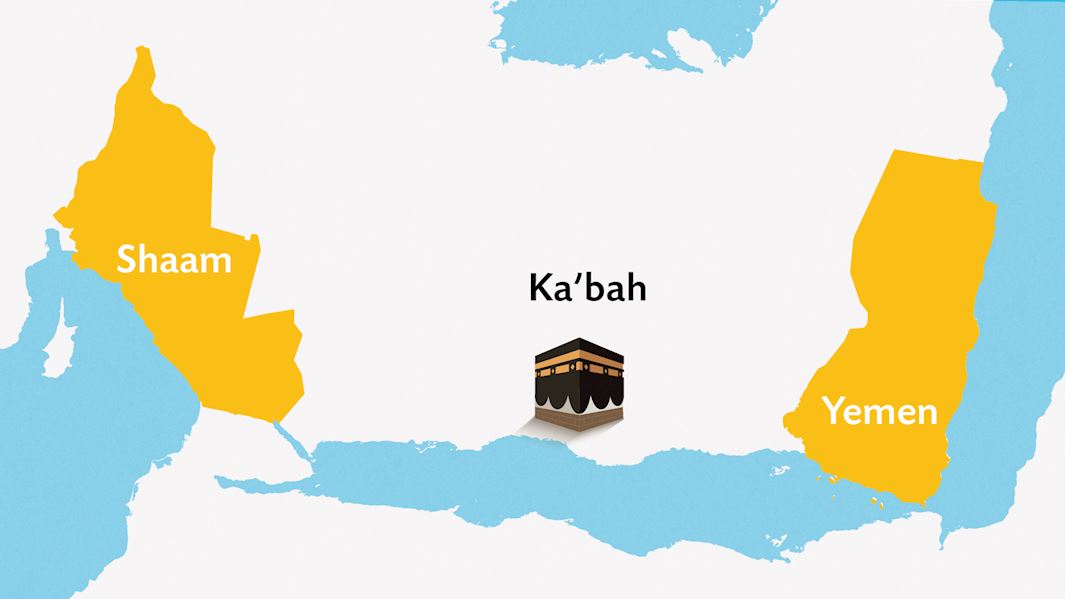
The great Imam Bukhari (rh) said, ‘Yemen was called so because it is situated to the right of the Ka’bah and Shaam was called so because it is situated to the left of the Ka’bah [when looking eastward]’. [Bukhari]
Thus, these blessed lands are not only mentioned in Allah’s Book, their names are actually connected to Allah’s House itself!
It is important to note that one corner of the Ka’bah points to north to Shaam, while its two Yemeni corners including the one containing the Black Stone point to the south. The remaining corner points to Iraq in the east.
Three: The people of Shaam and Yemen are connected by blood
The people of Shaam and Yemen are also connected by their ancestor, Saba Abd Shams ibn Yashjub ibn Ya‘rub ibn Qahtan,a mentioned in Tafseer Ibn Katheer.
Significantly, Surah 34 is named after this noble man, and he is mentioned in ayah 15. The Prophet (saw) was thus asked about this name:
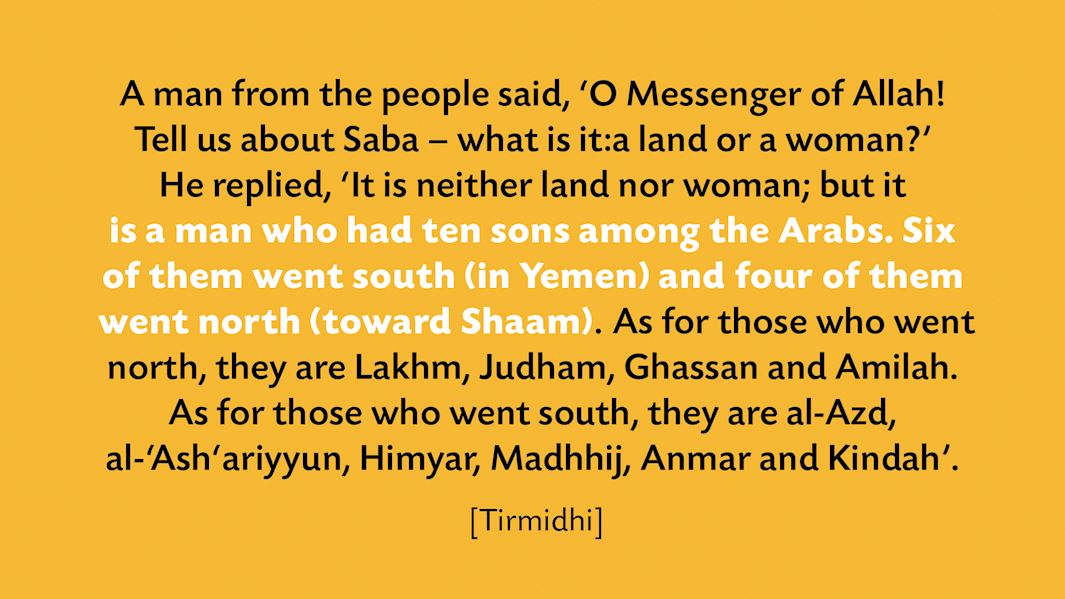
The word Saba means ‘to scatter’. His tribe was the first Arab tribe to disperse or ‘scatter’ throughout Shaam and Yemen, after a flood swept away a dam in Ma’rib, as mentioned in the Qur’an:
‘But they turned away. So We sent against them a devastating flood, and replaced their orchards with two others producing bitter fruit, fruitless bushes, and a few sparse thorny trees’. [Qur’an, 34:16]
Thus, ten Arab tribes were descended from Saba’s sons, connecting the people of Shaam and Yemen by blood.
Later in the Surah, Allah continues Saba’s story by describing how his people travelled between towns in Shaam and Yemen, especially the holy city of al-Quds (Jerusalem). [Tabari]
‘We had also placed between them and the cities We showered with blessings [amongst them is Jerusalem] many small towns within sight of one another. And We set moderate travel distances in between, saying, “Travel between them by day and night safely”’. [Qur’an, 34:18]
Four: Queen Bilqis of Yemen travelled to Shaam to become Muslim
Saba’s sons had connected Yemen and Shaam by settling throughout these two blessed lands. From the lineage of Saba came Queen Bilqis, who once more connected these lands in a famous journey mentioned in the Qur’an.
Bilqis bint Sharahil (as), often referred to as the Queen of Sheba (Saba), ruled over a kingdom on the southern Arabian Peninsula (i.e. present-day Yemen, with her palace located in the city of Ma’rib near Sana’). Her people were sun-worshippers. Historians described her palace as:
’In it, there were 360 windows on the east side, and a similar number on the west, and it was constructed in such a way that each day, when the sun rose, it would shine through one window, and when it set, it would shine through the opposite window. And the people used to prostrate to the sun morning and evening’. [Tafseer Ibn Katheer]
This powerful queen lived at the same time as Prophet Sulaiman (as). He was able to communicate with birds and, one day, a hoopoe bird told him of this great palace and kingdom, where people worshipped the sun instead of its Creator:
‘I found a woman ruling them, and she has been given everything and has a magnificent throne’. [Qur’an, 27:23]
The Prophet Sulaiman (as) sent Queen Bilqis a letter through the hoopoe:
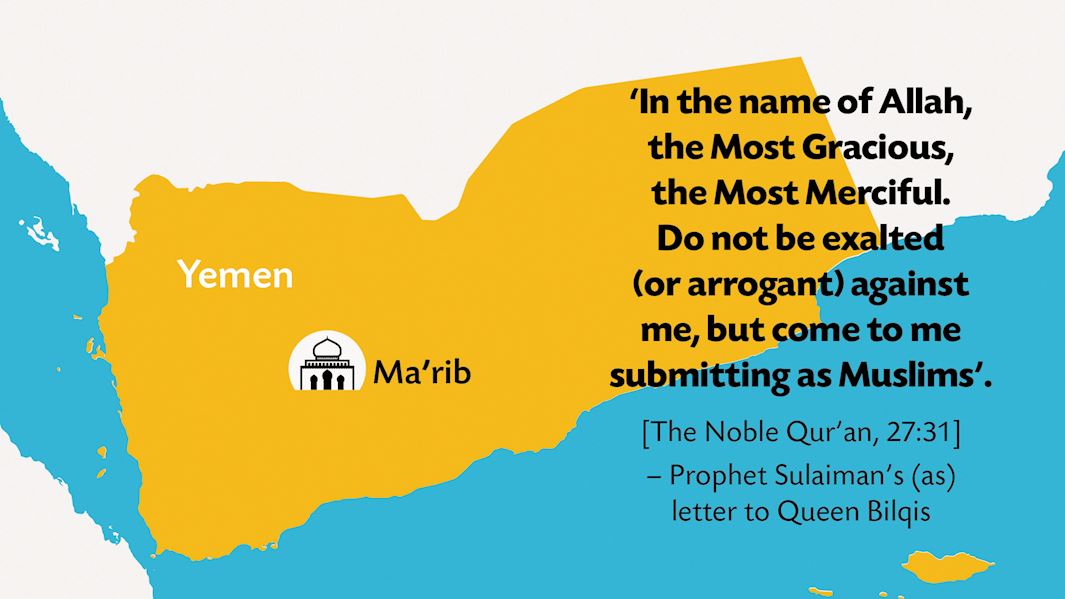
Queen Bilqis consulted her chiefs, who were willing to go to war with Sulaiman (as) if she commanded. However, the queen decided to send Sulaiman (as) a gift. Ibn Abbas (ra) and others said,
‘She said to her people, if he accepts the gift, he is a king, so fight him; but if he does not accept it, he is a Prophet, so follow him’. [Tafseer Ibn Katheer]
Of course, Sulaiman (as) rejected her huge gift of gold, jewels, pearls and other treasures! When he sent it back to her, she realised that he was a Prophet, and immediately began travelling some 1,500 miles to meet him with her army.
Bilqis (as) and Sulaiman (as) met in Masjid Al-Aqsa in Al-Quds, where he showed her several miracles with Allah’s help. The Yemeni Queen then became Muslim, in the heart of the holy land of Shaam.
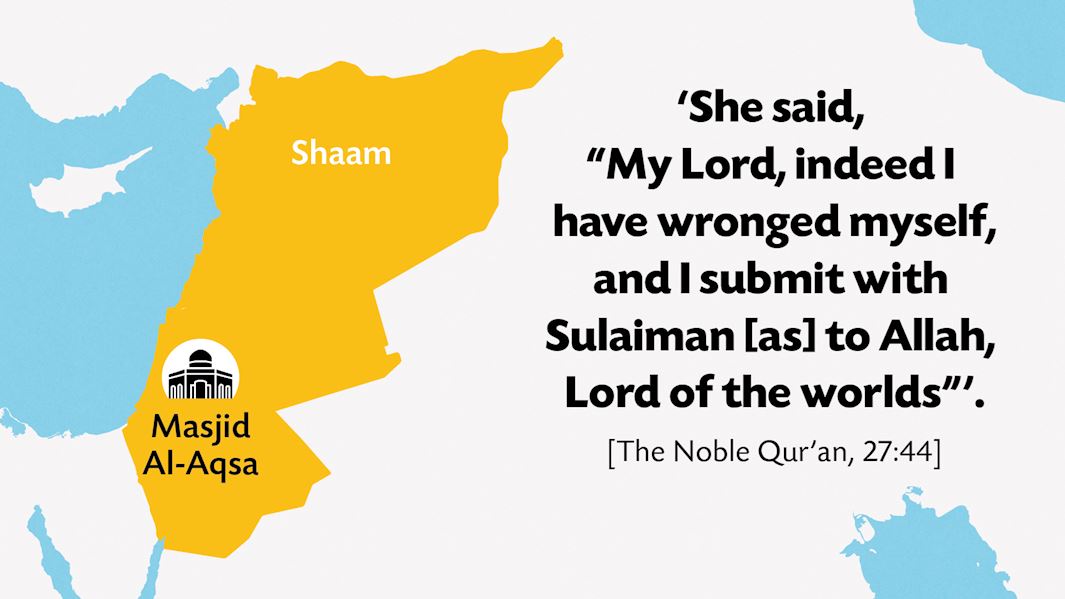
According to Ibn Abbas, Queen Bilqis later married Prophet Sulaiman (as). [Tafseer Ibn Katheer]
Five: The Quraish connected Shaam and Yemen by trade
The Prophet’s (saw) noble great-grandfather, Amr ibn Abd Manaf (often referred to by his nickname, Hashim), initiated trade routes to Yemen during the winter, and trade routes to Shaam in the summer. This became the established trade route of the Quraish, and Allah mentions it in Surah Quraish:
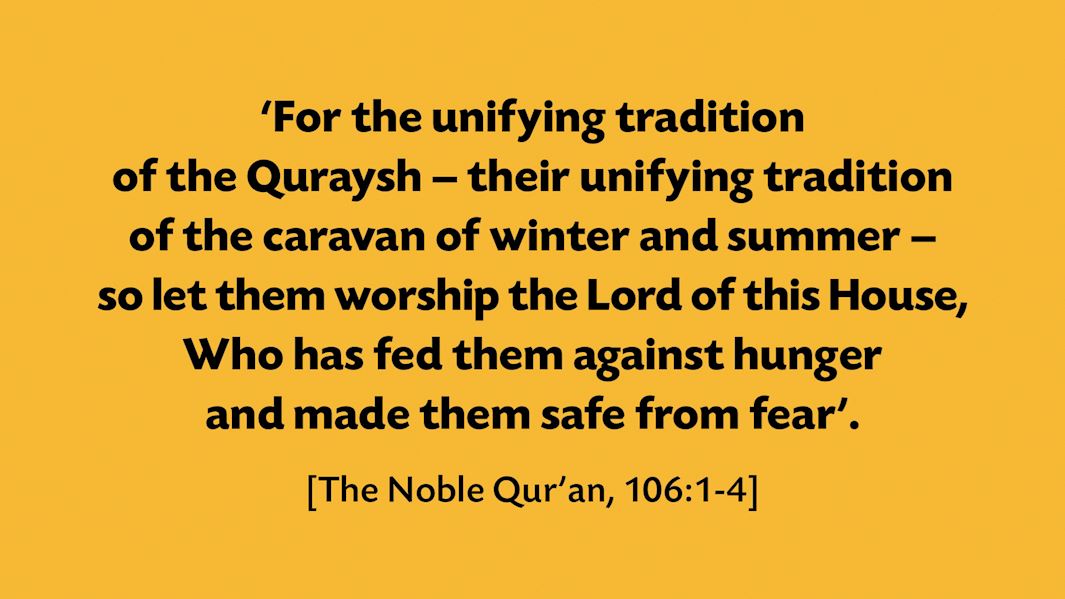
Ibn Jarir (rh) comments on Surah al-Feel and Surah Quraish, saying, ‘It is as though He is saying, “You should be amazed at the uniting (or taming) of the Quraish and My favour upon them in that”’. [Tafseer Ibn Katheer]
For Allah not only protected the Ka‘bah from an army during the Year of the Elephant, but as residents of Allah’s Sanctuary, they were safe even on their trade journeys to Shaam and Yemen, and thus they continued to be prosperous.
It is interesting to note that the Prophet’s (saw) great-grandfather, Hashim, not only established these trade journeys but he also passed away in Shaam during one of them. After marrying Salma bint Amr, he left on a trade journey to Shaam while she was pregnant. He passed away in Gaza in 497 CE, and Salma later gave birth to Abdul-Muttalib, the grandfather of the Prophet (saw).
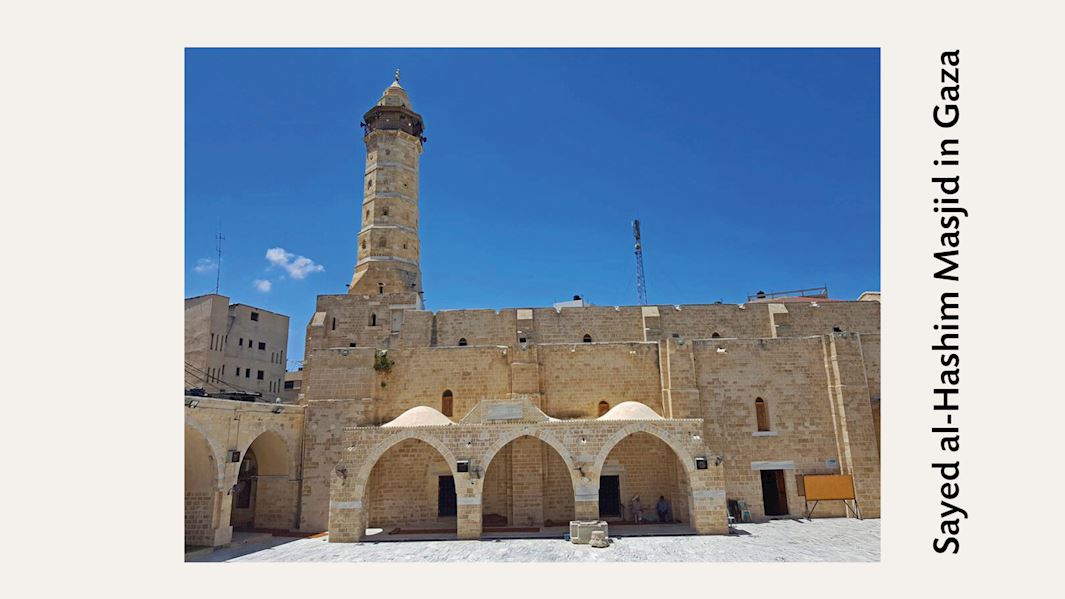
Six: Allah (swt) connected them to the Prophet (saw)
Trade with Shaam and Yemen brought the Prophet’s (saw) tribe prosperity; later, these lands were a direct support to the Prophet (saw) himself.
The Messenger of Allah (saw) said, ‘Indeed, Allah faced me towards Shaam and turned my back to Yemen and He said to me, “O Muhammad [saw]! Indeed, I have placed for you spoils of war [or immunity, in a different narration] and sustenance in front of you and assistance behind your back”’. [Tabarani]
As mentioned before, Shaam and Yemen were connected by their ancestor, Saba. Incredibly, Saba himself was a Muslim who had hoped to support the Prophet (saw)!
According to Ibn Dihyah (rh), Saba wrote the following verses:
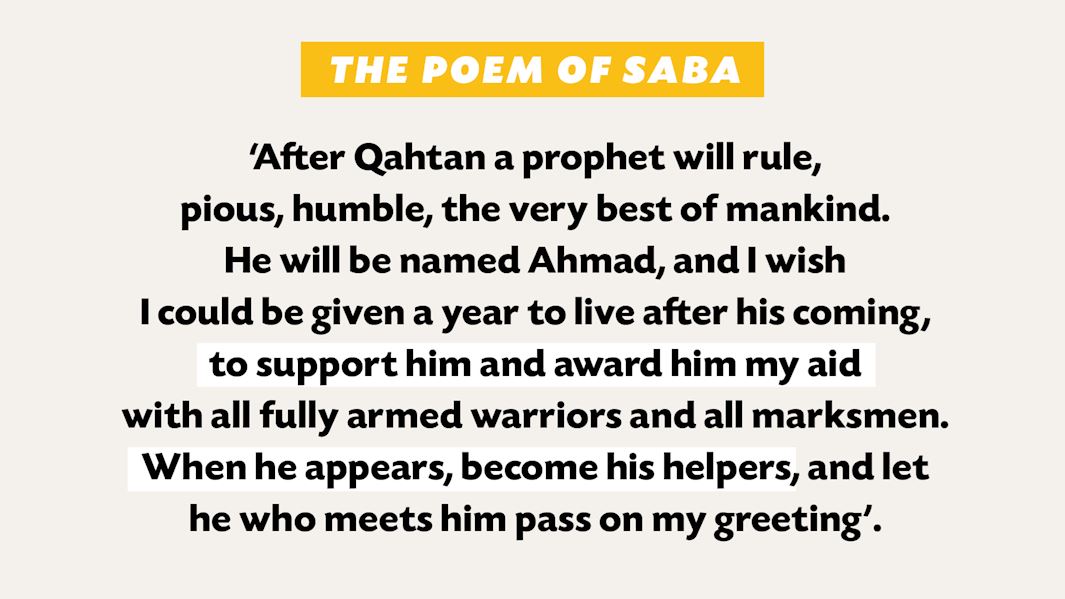
SubhanAllah, even before the Prophet’s (saw) arrival, he was supported by the ancestor of blessed Shaam and Yemen! And Saba’s descendants in the blessed lands helped and obeyed him as he (saw) carried the message of Islam.
Seven: There will be armies in both Shaam and Yemen near the end of time
The blessed lands were historically important, and they will continue to be important in the future, as shown in the following hadith:
Ibn Hawalah (ra) said, ‘The Messenger of Allah (saw) said, “The matter will turn out that you will be standing armies, one in Shaam, one in Yemen and one in Iraq”’.
Ibn Hawalah (ra) said, ‘Choose for me, O Messenger of Allah [saw], if I reach that (time)’.
He [saw] said, ’Go to Shaam, for it is the chosen land of Allah in all of His earth, to which He selects His chosen servants to. But if you do not wish to go there, then go to your Yemen and drink from your streams. For indeed Allah has on my account taken special charge of Shaam and its people’. [Abu Dawud]
In the above hadith, the Prophet (saw) singled out Shaam and Yemen as lands to travel to near the end of time, as they are divinely chosen and blessed.
Eight: Signs of the Day of Judgement will appear in Shaam and Yemen
Moreover, the Prophet (saw) said that there would be other signs of the Last Hour which appeared in Shaam and Yemen.
On the authority of Salim ibn Abdullah ibn Umar (ra) from his father (ra) who said, ’The Messenger of Allah (saw) said, “A (huge) fire will come from Hadramaut (a Yemeni region on the southern end of the Arabian Peninsula) or from the direction of [the sea of] Hadramaut before the Day of Resurrection, which will gather the people [in Shaam]”.
They said, “O Messenger of Allah! What do you order us then?”
He said, “You must go to Shaam”’. [Tirmidhi]
Once again, we can see how Allah and His Messenger (saw) singled out Shaam and Yemen, not only historically but also at the end of time. It is thus vital that we pay attention to these ‘elite’ lands:
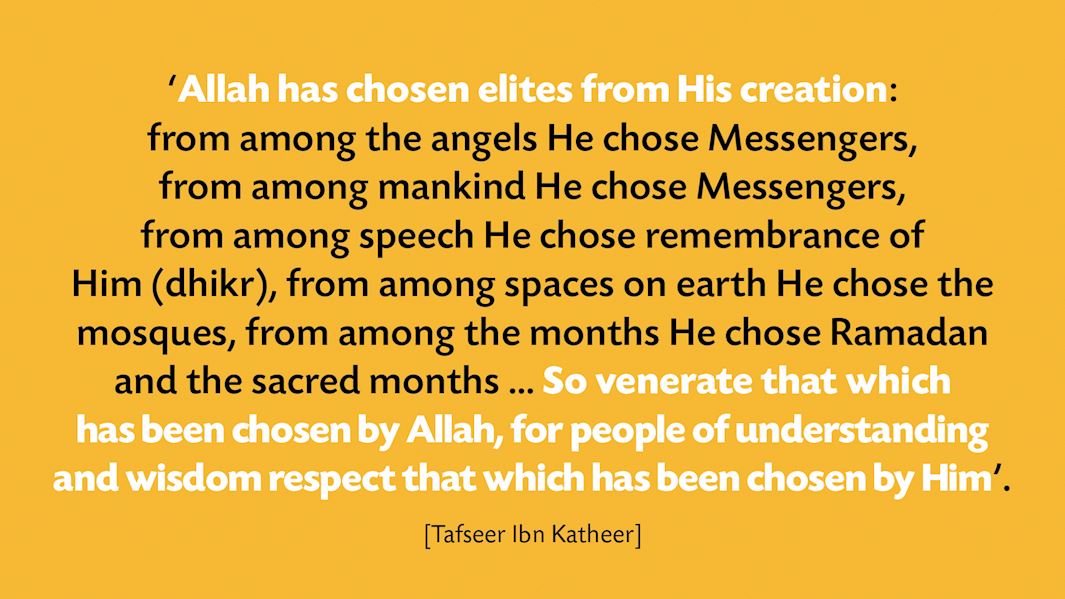
Nine: The Prophet (saw) connected them in his du’a
In addition to being blessed by Allah, these lands were also blessed by His Prophet (saw)!
As well as praising their individual virtues, the Messenger of Allah (saw) also blessed them at the same time, saying, ‘O Allah bless us in our Shaam! O Allah bless us in our Yemen!’ [Tirmidhi]
Moreover, he (saw) also used to pray for these lands. Of course, the Prophet (saw) used to pray for his entire Ummah, but he singled out Iraq, Shaam and Yemen for a special du’a:
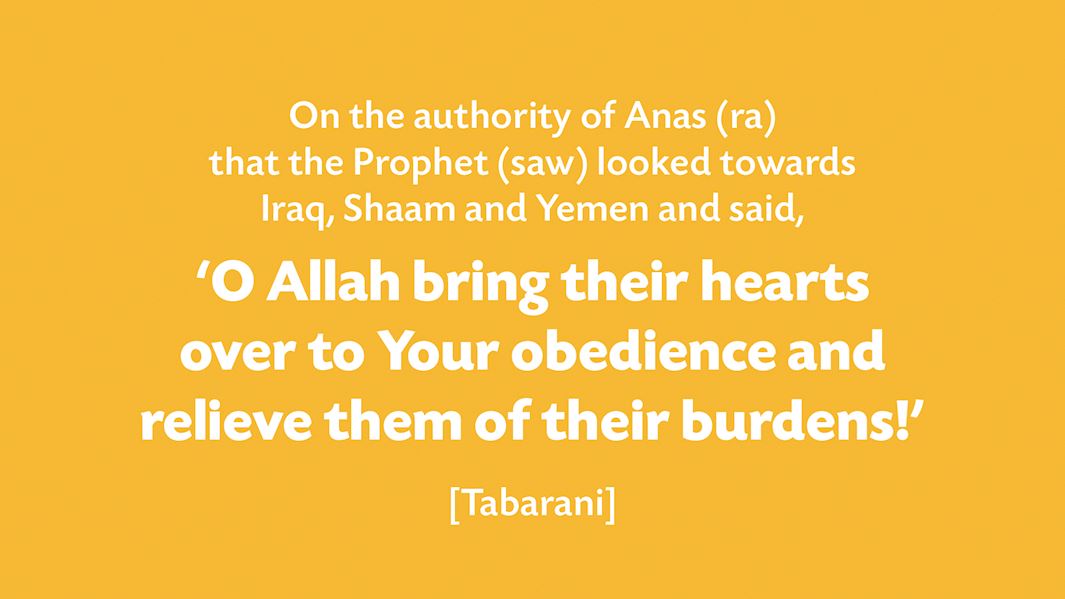
Consider this beautiful relationship between these blessed lands and the Prophet (saw). They were a support and a relief to him, helping him to carry the message of Islam, and he (saw) loved them so much that he directly asked Allah to bless them.
The Muslims of today have the opportunity to support the people the Prophet (saw) himself prayed for. It is our responsibility and our honour to serve these blessed lands, and we shouldn’t forget them in their hour of need.
Here are just a few ways you can support Shaam and Yemen:
- Provide water in Yemen: £1 gives water for life to one person
- Give daily bread in Syria and Yemen: £10 feeds 50 people
- Shelter displaced families in Syria: £2,000 builds one house and you can give any amount to the Syria Homes Fund. (Call 0115 911 7222 to set up a payment plan)
We hope this article was helpful to you! Do follow us on Facebook, Instagram, Twitter and YouTube so you can see more posts about the blessed lands. They are mentioned so often in the Qur’an and Hadith, and it is essential for all Muslims to understand their status.
Don’t forget to share this article with friends and family! As the Prophet (saw) said, ‘Whoever guides someone to goodness will have a reward like one who did it’. [Muslim]